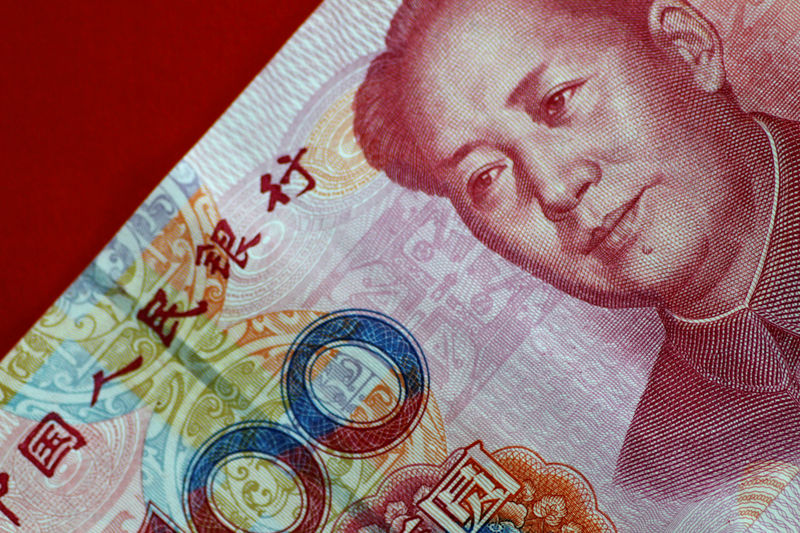SHANGHAI (Reuters) - China's yuan slipped to a fresh 11-year low against the dollar on Thursday, despite support from major state-owned banks in both the spot and forwards markets.
Traders said sentiment was fragile, with recent news headlines offering little hope of a U.S-China trade deal anytime soon and new U.S. levies on Chinese goods set to go into effect on Sept. 1.
U.S. President Donald Trump said on Wednesday he was "the chosen one" to address trade imbalances with China, even as congressional researchers warned that his tariffs would hurt the American economy.
"The market pays very close attention to the China-U.S. trade dispute, and its impact on the yuan is much heavier than other factors, such as economic fundamentals," said a trader at a Chinese bank in Shanghai.
Prior to the market opening, the People's Bank of China (PBOC)set the midpoint rate
Spot yuan
State-run banks seen were receiving dollar liquidity in the forwards market before selling the greenback in the onshore spot market, two traders with knowledge of the matter said.
One of them said state banks were seen selling dollars at around 7.07 yuan in the spot market to prevent sharper losses in the local unit.
The moves injected a note of caution, fueling speculation that authorities may be trying to establish a floor for the yuan around that level in the near term, the trader added.
State-owned banks are widely believed by many investors to act on behalf of the central bank in the country's foreign exchange market, although they can trade on their own behalf as well.
Major state banks have been using such tactics frequently
in recent weeks as authorities seek to slow the currency's decline after letting it breach the key 7 to the dollar level on Aug. 5. Washington labeled China a currency manipulator hours after the move, which roiled global financial markets.
Acquiring dollars via dollar/yuan swaps and then selling then in the spot market had certainly arrested bigger declines in the yuan, traders said.
One trader said dollar demand picked up this week, and could have dragged the local currency across 7.1 per dollar if the state banks had not stepped in. In addition, major oil companies also have to load up on dollars for their seasonal payments.
Serena Zhou, China economist at Mizuho Securities in Hong Kong, said the breach of the closely watched 7 level has given the yuan more flexibility. She doubts a trade deal can be reached soon and expects more yuan weakness in coming months.
Zhou expects the yuan to finish the year at 7.1 per dollar.
In the offshore market, signs of liquidity tightness in Hong Kong continued to offer slight support for the yuan.
Yuan borrowing costs eased across tenors on Thursday but remained at relatively high levels in the financial hub on Thursday morning as seen from the CNH Hong Kong Interbank Offered Rate benchmark (CNH Hibor).
The offshore yuan
Spread between onshore and offshore yuan stood at 123 pips at midday, down from 247 pips seen on Monday.
The global dollar index (DXY) stayed flat at 98.295 at midday from the previous close of 98.295.
